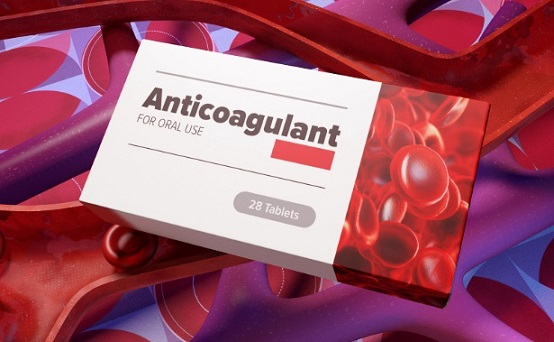Nikhil Prasad Fact checked by:Thailand Medical News Team Jan 03, 2025 1 year, 1 month, 2 days, 14 hours, 45 minutes ago
Medical News: A groundbreaking study conducted by a team of international researchers sheds light on the life-saving potential of anticoagulant therapy for patients suffering from non-COVID-19 pneumonia. The research team comprised experts from the Department of Pulmonary and Critical Care Medicine at the Seventh Medical Center, Chinese PLA General Hospital, Beijing-China, the University of Pittsburgh School of Medicine-USA, and other prominent institutions. This comprehensive retrospective study aimed to determine the safety and efficacy of anticoagulants for treating patients with non-COVID-19 pneumonia, an area that has remained underexplored despite significant medical advancements.
 Anticoagulant Therapy Benefits in Non-COVID-19 Pneumonia Patients
Anticoagulant Therapy Benefits in Non-COVID-19 Pneumonia Patients
Non-COVID-19 pneumonia continues to be a leading global health challenge, with millions of cases reported annually. Severe cases often lead to complications such as sepsis and acute respiratory distress syndrome (ARDS), which can have devastating consequences. Previous studies have demonstrated the benefits of anticoagulant therapy in COVID-19 patients, prompting scientists to investigate its application in other critical illnesses. This
Medical News report explores how this therapy influences outcomes in pneumonia cases unassociated with COVID-19.
Study Methods and Analysis
The research utilized the Medical Information Mart for Intensive Care-IV (MIMIC-IV) database, which includes extensive health records from critical care units. The study analyzed data from 1,510 patients diagnosed with non-COVID-19 pneumonia. These patients were divided into two groups: those who received anticoagulant therapy (755 individuals) and those who did not (755 individuals).
Antiplatelet therapy included aspirin, tirofiban, clopidogrel, and other related agents. Antipathogen therapy included both antiviral and antibiotic agents, including but not limited to zanamivir, oseltamivir, amantadine, amoxicillin, clindamycin, levofloxacin, and other relevant antimicrobials. Glucocorticoid therapy included the use of dexamethasone, prednisone, hydrocortisone, and other similar corticosteroids. Anticoagulant therapy included warfarin, heparin, enoxaparin, apixaban, and other related anticoagulants. Patients who died were excluded from the calculation of length of MVD at day 28, ICU and hospital
stay.
Researchers employed a robust methodology, including propensity score matching (PSM), univariate and multivariate Cox regression analyses, and Kaplan-Meier survival curves, to ensure the reliability of their findings.
Key variables influencing patient outcomes, such as age, sex, comorbidities, laboratory values, and therapeutic interventions, were examined. Additionally, predictive models were developed to forecast the 7-day survival rates for pneumonia patients. These models underwent rigorous validation, with results indicating strong predictive accuracy.
Key Findings
One of the most significant outcomes of the study was the observed reduction in mortality rates among patients treated with ant
icoagulants. The 7-day mortality rate for those who received anticoagulant therapy was significantly lower at 6.4% compared to 22.9% for those who did not. Similarly, 30-day mortality rates dropped from 35.9% in the non-anticoagulant group to 20.7% in the anticoagulant group. These findings highlight the critical role of anticoagulant therapy in improving short-term survival for pneumonia patients.
Moreover, the study revealed that anticoagulant therapy’s benefits extended across various subgroups, including female patients, individuals with elevated creatinine levels, and those receiving antiplatelet or antipathogen therapies.
Women, in particular, appeared to benefit more from anticoagulant therapy, a phenomenon potentially linked to biological differences and hormonal influences on coagulation pathways.
Interestingly, the administration of anticoagulants did not significantly increase the risks of peptic ulcers or gastrointestinal hemorrhage, which are often cited as major concerns in anticoagulant use. Rates of peptic ulcers and gastrointestinal hemorrhage were comparable between the anticoagulant and non-anticoagulant groups, suggesting that the therapy’s benefits outweigh its risks when applied judiciously.
Prolonged Hospitalization
Although patients treated with anticoagulants had longer ICU and hospital stays compared to their counterparts, researchers attributed this to improved survival rates among severely ill individuals. The extended treatment duration reflects the intensive care required for these patients to recover fully. For instance, the median ICU stay for anticoagulant-treated patients was 119.3 hours, compared to 62.2 hours for the non-treated group.
The Biological Mechanisms
The study underscored the multifaceted benefits of anticoagulant therapy beyond its role in preventing blood clots. Anticoagulants were found to mitigate inflammatory responses by inhibiting pathways such as NF-κB activation, which plays a pivotal role in the inflammation-coagulation cascade. Additionally, anticoagulants enhanced bacterial clearance and prevented the progression of inflammatory damage, thereby stabilizing patients’ conditions.
Broader Implications
The results of this study have significant implications for clinical practice. By reducing mortality and preventing severe complications, anticoagulant therapy could emerge as a cornerstone in the treatment of pneumonia. However, the researchers emphasized the need for tailored approaches, considering individual patient characteristics and the potential for adverse effects in specific populations.
Conclusion
This retrospective cohort study provides compelling evidence supporting the use of anticoagulant therapy in non-COVID-19 pneumonia patients. By demonstrating reduced mortality rates and minimal risk of severe side effects, the study opens new avenues for improving patient outcomes. The findings are particularly relevant for severe cases, female patients, and those receiving complementary therapies such as antiplatelets and antipathogens.
Future research is essential to validate these findings across diverse populations and clinical settings. Large-scale randomized controlled trials could further establish the safety and efficacy of anticoagulants in pneumonia treatment. By addressing these questions, the medical community can refine therapeutic strategies and enhance care for pneumonia patients worldwide.
The study findings were published on a preprint server and are currently being peer reviewed.
https://papers.ssrn.com/sol3/papers.cfm?abstract_id=5076145
For the latest research on Pneumonia, keep on logging to Thailand
Medical News.
Read Also:
https://www.thailandmedical.news/news/medicinal-herb-cimicifugae-rhizoma-shows-promise-in-treating-acute-pneumonia
https://www.thailandmedical.news/news/australian-study-finds-that-multivitamins-do-not-improve-clinical-outcomes-in-community-acquired-pneumonia
